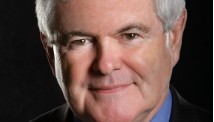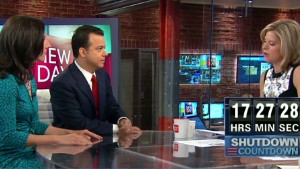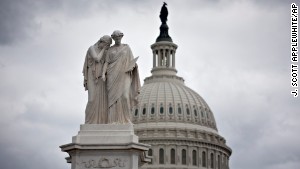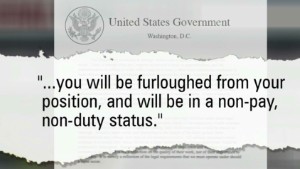Home » Archives for September 2013
'Big Bang Theory' star's goof
Posted by Unknown
Gingrich: GOP, don't cave
Posted by Unknown
Editor's note: Newt Gingrich is a co-cost of CNN's new "Crossfire," which airs at 6:30 p.m. ET weekdays. A former speaker of the House, he was a candidate in the 2012 Republican presidential primaries.
(CNN) -- The worst possible outcome for the country from the impasse over the continuing resolution that would prevent a government shutdown would be for House Republicans to cave.
This is a pivotal conflict that will define the relationship between Congress and the executive branch for the next three years. The country will be much better off if Congress does not abdicate its constitutional role and if the president cannot ignore that role.
When President Barack Obama is willing to negotiate with Russian, Syrian and Iranian leaders but unwilling to negotiate with the U.S. House of Representatives, it is time for the House to stand firm.
 Newt Gingrich
Newt Gingrich When Senate Majority Leader Harry Reid says, according to unnamed sources quoted in Politico, that he will refuse to attend a negotiation at the White House because House Republicans have to cave and surrender to his terms, it is time to stand firm.
When a senior, unnamed Democratic official is quoted Monday morning calling for no negotiations and saying "it's time to punch the bully in the nose," it is time to stand firm.
Begala: Bet on Obama in shutdown showdown
When Obama spends a week making three partisan speeches attacking Republicans and then calls House Speaker John Boehner to tell him, "I will not negotiate," it is time to stand firm.
 The finances of a shutdown
The finances of a shutdown  Judd Gregg on U.S. shutdown
Judd Gregg on U.S. shutdown  Government shutdown and you
Government shutdown and you It is a sad commentary on Obama's attitude toward the elected majority of the House of Representatives that he could have a more pleasant conversation with the head of the Iranian dictatorship than with the elected leader of the U.S. House.
The left has sold itself on a false history of the 2012 election. According to the left, Obama won the election and therefore we should do whatever he wants.
This ignores that there was also an election for the "People's House" in 435 congressional districts, and the Republicans won. It also ignores the 63 million Americans who voted against his re-election and his agenda. Winning 52% does not mean he gets 100% of what he wants.
Zelizer: Government shutdown threat is getting very old, very fast
The president has decided to seek to bully and bluff his way to get what he wants. House Republicans must not abdicate their responsibilities now.
Any surrender on the continuing resolution would confirm the contempt with which Obama and Reid already hold Boehner and his Republican colleagues. This fight is about something much bigger than the Republican Party and the future of Obamacare.
It is about whether the president dictates to America's elected representatives or negotiates with them when they disagree. It will be very bad for America if a president whose hubris is astounding is reinforced in the belief that he can bully his way into getting everything he wants by making demagogic attack speeches.
The next few weeks might be painful if House Republicans insist on getting to a compromise and refuse to surrender. But the next three years will be frightening if House Republicans cave and the president learns that nothing stands between him and his ability to use overweening power outside the Constitution to advance his ideology.
This is a big moment of decision for America. Don't give in now.
Follow @CNNOpinion on Twitter.
Join us at Facebook/CNNOpinion.
Why Obama is winning shutdown fight
Posted by Unknown
Editor's note: Paul Begala, a Democratic strategist and CNN political contributor, was a political consultant for Bill Clinton's presidential campaign in 1992 and was counselor to Clinton in the White House.
(CNN) -- As Washington hurtles toward a government shutdown, the go-to move for the uninformed is to blame both sides equally. Just say, "A pox on both their houses," and you can get through any neighborhood barbecue or TV talk show.
But what if you really want to know what's happening? There are three metrics you should track if you want to know who will come out ahead in a government shutdown:
Which side is more united?
One of President Clinton's laws of politics is: "Democrats want to fall in love, Republicans just want to fall in line." Which is what makes the GOP fratricide so interesting.
 Paul Begala
Paul Begala Savaging your colleagues, undermining your leaders, backbiting and backstabbing -- these are usually Democratic specialties. But not now. Credit the strong leadership of House Democratic Leader Nancy Pelosi and Senate Majority Leader Harry Reid with keeping a remarkably diverse Democratic Congress together. When you can keep a strong conservative like Sen. Joe Manchin of West Virginia on the same page with the powerfully progressive Rep. Keith Ellison of Minnesota, you are definitely winning.
Meanwhile, the GOP, whose members range from conservative to ultraconservative, is at war with itself and its leaders. Sen. Ted Cruz of Texas led the fight on the Senate floor to block consideration of the funding bill. But after a pointless 21-hour talkathon, the majority of his GOP colleagues rejected Cruz's strategy. Senate Republicans split badly and bitterly; 25 voted against Cruz while just 19 voted with him.
In the House, it is chaos. The Neanderthals are fighting the Cro-Magnons and the Homo erectus tough guys are fighting the australopithecines.
Which side is more mainstream?
A majority of voters don't like the Affordable Care Act -- although that's a bit misleading, because a percentage of them dislike it because they think it doesn't go far enough.
 Road blocks in debt ceiling compromise
Road blocks in debt ceiling compromise  No game plan to avoid a shutdown
No game plan to avoid a shutdown  What happens to workers in shutdown?
What happens to workers in shutdown? I like it -- in fact, I love it -- but that's not the point of this column. Obamacare clocks in at just 29% support in a recent CNBC poll. So you'd think that the Republicans' position of repealing the ACA would be more mainstream. But you'd be wrong.
That same CNBC poll shows that Americans oppose defunding Obamacare, with only a little more than one-third of voters saying they want it defunded. They want to mend it, not end it.
What's worse for the Republicans, when the question shifts to whether you support shutting down the government and/or defaulting on U.S. debt in order to kill Obamacare, the GOP position loses by a crushing 59 to 19 percentage points. When you're down to just 19% of your countrymen and -women supporting your crusade, it's time (as we say in Texas) to pee on the fire and call the dogs: The hunt's over.
That is, no doubt, why the House Republicans have retreated to their new position: delaying Obamacare for a year rather than outright defunding it. But health care delayed is health care denied, and it's a bit of a reach to demand a one-year delay in the president's top domestic priority in exchange for funding the government for 10 weeks.
Which side is more reasonable?
It is hard to seem reasonable when you are pursuing a strategy that even conservative Republicans like Sen. Richard Burr called "the dumbest idea I've ever heard of." Keep in mind this is from a man who represents North Carolina, where the Republicans proposed a law barring federal courts from interpreting the Constitution, and allowing the North Carolina Legislature to declare a state religion. (Which might have passed had they chosen the right religion for the Tarheel State: college basketball.)
And yet there is hope for the GOP here. Every time the president says "I will not negotiate on the debt ceiling" -- a phrase he utters even more often than "Just pass me the ball, Joe, I'm open!" -- he risks looking unreasonable.
As a matter of substance, I strongly agree with his position. But as a matter of rhetoric and positioning, he would be better served to state his position this way: "I will gladly listen to any idea to improve the Affordable Care Act, or reduce the deficit, or any other ideas my Republican friends might have. But first we have to avoid default. That means paying the bills that Congress has already incurred. Once we've done that we can negotiate on anything."
Same substantive position: Negotiations on policy come only after the nation avoids default. But this formulation emphasizes the president's willingness to be flexible on improving the ACA and other Obama priorities.
Of course, nothing is certain in life. But if I were a betting man, I'd bet on President Obama and the Democrats in this fight. As long as Republicans appear more divided, more extreme and more unreasonable, they are going to lose. And then they will look weak as well.
Follow us on Twitter @CNNOpinion.
Join us on Facebook/CNNOpinion.
Shutdown could be shock therapy
Posted by Unknown
Editor's note: David Gergen is a senior political analyst for CNN and has been an adviser to four presidents. A graduate of Harvard Law School, he is a professor of public service and director of the Center for Public Leadership at Harvard University's Kennedy School of Government. Follow him on Twitter.
(CNN) -- Driven by a hard-line faction of conservatives, Washington is on the verge of doing something terribly stupid: shutting down the national government. Most of America is aghast. But it is also just possible that doing something stupid will help us avoid doing something truly dangerous.
Shutdowns are a lousy way to run a government. Just for starters, this one would cut off services to women and children in need, furlough hundreds of thousands, further shake the confidence of the public, send a shudder through the financial world and create new storm clouds over the economy. And once again the world will wonder about our capacity for leadership.
But all of this damage pales in comparison with the danger posed by a second, lurking threat: a default on our public finances.

The United States has had 17 government shutdowns since 1977 and has generally recovered well. But we have never had a default. Experts, while not fully certain, are convinced that it could be hugely destructive -- even leading to a worldwide financial meltdown. Unless Congress and the White House get their act together, we could default in less than three weeks.
But a shutdown this week could have a silver lining. It could be such an electric shock to the political system that it forces the politicians in Washington to settle their squabbles before the default deadline.
What we know from past shutdowns is that not only citizens -- especially older ones dependent on Social Security and Medicare -- start raising hell, but so do business and financial leaders who see damage rippling across their economic interests. Politicians are increasingly seen as villains. Pressure tends to grow so unbearable that eventually Washington finds a solution.
Most of the pressure this time will be directed toward Republicans who have misplayed their hand. A new poll by CNN/ORC shows that 46% of Americans would blame a shutdown on Republicans, seeing them as spoiled children. Thirty six percent blame President Obama, and 13% point fingers at both.
 Peter King: Ted Cruz 'is a fraud'
Peter King: Ted Cruz 'is a fraud'  The man behind the government shutdown
The man behind the government shutdown  The finances of a shutdown
The finances of a shutdown Seasoned GOP leaders across the country know that if a shutdown does serious damage, chances of Republicans picking up Senate seats in 2014 and the White House in 2016 could evaporate. Those leaders will push intensely for a way out.
But Republicans are not the only ones who will come under pressure to find a settlement. So will Democrats, starting with President Obama. We expect our presidents to be leaders of all the people, not a single party or ideology. We want them to rise above the squabbling and keep us on track. The harsh rhetoric that the president has been directing at Republicans suggests that he is less interested in settlement than unconditional surrender.
Moreover, as Republicans make their counterarguments, it is becoming increasingly apparent that they have some valid questions. Is Obamacare truly ready for prime time? Shouldn't the two parties work together on the tax code? When is Washington going to get serious about overhauling the entitlement programs so they will survive for coming generations?
Yes, conservative hard-liners have chosen the wrong place to fight; arguments over Obamacare are no excuse to shut down the government. Yes, hard-liners like Sen. Ted Cruz, R-Texas, are creating deeper partisan divides. But Democrats can ill afford to continue rejecting any talks or negotiations.
The moment a shutdown happens, Obama has a fresh opportunity -- indeed a fresh responsibility -- to seize the mantle of leadership and get us out of this mess. Instead of just blaming the Republicans, he should call in the leaders of both parties and in Lyndon Johnson fashion, keep 'em talking till they get a deal.
Once a shutdown is under way, the president has new leverage to say, "Look, we are here to negotiate a settlement so that we can reopen the government. We are not here to negotiate over a possible default; I have said all along that I won't do that. But those of you who have been listening closely know that I have also been saying that I am open to conversations about settling our policy differences so that we can keep the government running.
"Tax reform, entitlement reform and even some tweaking of the Affordable Care Act are on the table now. I have only two conditions: I will not accept a gutting of Obamacare -- we settled that at the ballot box in 2012 -- and any settlement here must include a pledge not to let the country go into default. So, let's get started."
Would it work? Who knows for sure? But one thing is clear: If enough Americans rise up now and pressure politicians in Washington to call off this circus, we could not only end this foolishness over a shutdown, but we could also avoid a truly dangerous default. And we could hold our heads up again.
Follow us on Twitter @CNNOpinion.
Join us on Facebook/CNNOpinion.
Why Obama winning shutdown fight
Posted by Unknown
Editor's note: Paul Begala, a Democratic strategist and CNN political contributor, was a political consultant for Bill Clinton's presidential campaign in 1992 and was counselor to Clinton in the White House.
(CNN) -- As Washington hurtles toward a government shutdown, the go-to move for the uninformed is to blame both sides equally. Just say, "A pox on both their houses," and you can get through any neighborhood barbecue or TV talk show.
But what if you really want to know what's happening? There are three metrics you should track if you want to know who will come out ahead in a government shutdown:
Which side is more united?
One of President Clinton's laws of politics is: "Democrats want to fall in love, Republicans just want to fall in line." Which is what makes the GOP fratricide so interesting.
 Paul Begala
Paul Begala Savaging your colleagues, undermining your leaders, backbiting and backstabbing -- these are usually Democratic specialties. But not now. Credit the strong leadership of House Democratic Leader Nancy Pelosi and Senate Majority Leader Harry Reid with keeping a remarkably diverse Democratic Congress together. When you can keep a strong conservative like Sen. Joe Manchin of West Virginia on the same page with the powerfully progressive Rep. Keith Ellison of Minnesota, you are definitely winning.
Meanwhile, the GOP, whose members range from conservative to ultraconservative, is at war with itself and its leaders. Sen. Ted Cruz of Texas led the fight on the Senate floor to block consideration of the funding bill. But after a pointless 21-hour talkathon, the majority of his GOP colleagues rejected Cruz's strategy. Senate Republicans split badly and bitterly; 25 voted against Cruz while just 19 voted with him.
In the House, it is chaos. The Neanderthals are fighting the Cro-Magnons and the Homo erectus tough guys are fighting the australopithecines.
Which side is more mainstream?
A majority of voters don't like the Affordable Care Act -- although that's a bit misleading, because a percentage of them dislike it because they think it doesn't go far enough.
 Road blocks in debt ceiling compromise
Road blocks in debt ceiling compromise  No game plan to avoid a shutdown
No game plan to avoid a shutdown  What happens to workers in shutdown?
What happens to workers in shutdown? I like it -- in fact, I love it -- but that's not the point of this column. Obamacare clocks in at just 29% support in a recent CNBC poll. So you'd think that the Republicans' position of repealing the ACA would be more mainstream. But you'd be wrong.
That same CNBC poll shows that Americans oppose defunding Obamacare, with only a little more than one-third of voters saying they want it defunded. They want to mend it, not end it.
What's worse for the Republicans, when the question shifts to whether you support shutting down the government and/or defaulting on U.S. debt in order to kill Obamacare, the GOP position loses by a crushing 59 to 19 percentage points. When you're down to just 19% of your countrymen and -women supporting your crusade, it's time (as we say in Texas) to pee on the fire and call the dogs: The hunt's over.
That is, no doubt, why the House Republicans have retreated to their new position: delaying Obamacare for a year rather than outright defunding it. But health care delayed is health care denied, and it's a bit of a reach to demand a one-year delay in the president's top domestic priority in exchange for funding the government for 10 weeks.
Which side is more reasonable?
It is hard to seem reasonable when you are pursuing a strategy that even conservative Republicans like Sen. Richard Burr called "the dumbest idea I've ever heard of." Keep in mind this is from a man who represents North Carolina, where the Republicans proposed a law barring federal courts from interpreting the Constitution, and allowing the North Carolina Legislature to declare a state religion. (Which might have passed had they chosen the right religion for the Tarheel State: college basketball.)
And yet there is hope for the GOP here. Every time the president says "I will not negotiate on the debt ceiling" -- a phrase he utters even more often than "Just pass me the ball, Joe, I'm open!" -- he risks looking unreasonable.
As a matter of substance, I strongly agree with his position. But as a matter of rhetoric and positioning, he would be better served to state his position this way: "I will gladly listen to any idea to improve the Affordable Care Act, or reduce the deficit, or any other ideas my Republican friends might have. But first we have to avoid default. That means paying the bills that Congress has already incurred. Once we've done that we can negotiate on anything."
Same substantive position: Negotiations on policy come only after the nation avoids default. But this formulation emphasizes the president's willingness to be flexible on improving the ACA and other Obama priorities.
Of course, nothing is certain in life. But if I were a betting man, I'd bet on President Obama and the Democrats in this fight. As long as Republicans appear more divided, more extreme and more unreasonable, they are going to lose. And then they will look weak as well.
Follow us on Twitter @CNNOpinion.
Join us on Facebook/CNNOpinion.
Bet on Obama in shutdown fight
Posted by Unknown
Editor's note: Paul Begala, a Democratic strategist and CNN political contributor, was a political consultant for Bill Clinton's presidential campaign in 1992 and was counselor to Clinton in the White House.
(CNN) -- As Washington hurtles toward a government shutdown, the go-to move for the uninformed is to blame both sides equally. Just say, "A pox on both their houses," and you can get through any neighborhood barbecue or TV talk show.
But what if you really want to know what's happening? There are three metrics you should track if you want to know who will come out ahead in a government shutdown:
Which side is more united?
One of President Clinton's laws of politics is: "Democrats want to fall in love, Republicans just want to fall in line." Which is what makes the GOP fratricide so interesting.
 Paul Begala
Paul Begala Savaging your colleagues, undermining your leaders, backbiting and backstabbing -- these are usually Democratic specialties. But not now. Credit the strong leadership of House Democratic Leader Nancy Pelosi and Senate Majority Leader Harry Reid with keeping a remarkably diverse Democratic Congress together. When you can keep a strong conservative like Sen. Joe Manchin of West Virginia on the same page with the powerfully progressive Rep. Keith Ellison of Minnesota, you are definitely winning.
Meanwhile, the GOP, whose members range from conservative to ultraconservative, is at war with itself and its leaders. Sen. Ted Cruz of Texas led the fight on the Senate floor to block consideration of the funding bill. But after a pointless 21-hour talkathon, the majority of his GOP colleagues rejected Cruz's strategy. Senate Republicans split badly and bitterly; 25 voted against Cruz while just 19 voted with him.
In the House, it is chaos. The Neanderthals are fighting the Cro-Magnons and the Homo erectus tough guys are fighting the australopithecines.
Which side is more mainstream?
A majority of voters don't like the Affordable Care Act -- although that's a bit misleading, because a percentage of them dislike it because they think it doesn't go far enough.
 Road blocks in debt ceiling compromise
Road blocks in debt ceiling compromise  No game plan to avoid a shutdown
No game plan to avoid a shutdown  What happens to workers in shutdown?
What happens to workers in shutdown? I like it -- in fact, I love it -- but that's not the point of this column. Obamacare clocks in at just 29% support in a recent CNBC poll. So you'd think that the Republicans' position of repealing the ACA would be more mainstream. But you'd be wrong.
That same CNBC poll shows that Americans oppose defunding Obamacare, with only a little more than one-third of voters saying they want it defunded. They want to mend it, not end it.
What's worse for the Republicans, when the question shifts to whether you support shutting down the government and/or defaulting on U.S. debt in order to kill Obamacare, the GOP position loses by a crushing 59 to 19 percentage points. When you're down to just 19% of your countrymen and -women supporting your crusade, it's time (as we say in Texas) to pee on the fire and call the dogs: The hunt's over.
That is, no doubt, why the House Republicans have retreated to their new position: delaying Obamacare for a year rather than outright defunding it. But health care delayed is health care denied, and it's a bit of a reach to demand a one-year delay in the president's top domestic priority in exchange for funding the government for 10 weeks.
Which side is more reasonable?
It is hard to seem reasonable when you are pursuing a strategy that even conservative Republicans like Sen. Richard Burr called "the dumbest idea I've ever heard of." Keep in mind this is from a man who represents North Carolina, where the Republicans proposed a law barring federal courts from interpreting the Constitution, and allowing the North Carolina Legislature to declare a state religion. (Which might have passed had they chosen the right religion for the Tarheel State: college basketball.)
And yet there is hope for the GOP here. Every time the president says "I will not negotiate on the debt ceiling" -- a phrase he utters even more often than "Just pass me the ball, Joe, I'm open!" -- he risks looking unreasonable.
As a matter of substance, I strongly agree with his position. But as a matter of rhetoric and positioning, he would be better served to state his position this way: "I will gladly listen to any idea to improve the Affordable Care Act, or reduce the deficit, or any other ideas my Republican friends might have. But first we have to avoid default. That means paying the bills that Congress has already incurred. Once we've done that we can negotiate on anything."
Same substantive position: Negotiations on policy come only after the nation avoids default. But this formulation emphasizes the president's willingness to be flexible on improving the ACA and other Obama priorities.
Of course, nothing is certain in life. But if I were a betting man, I'd bet on President Obama and the Democrats in this fight. As long as Republicans appear more divided, more extreme and more unreasonable, they are going to lose. And then they will look weak as well.
Follow us on Twitter @CNNOpinion.
Join us on Facebook/CNNOpinion.
19-country trip ... in a wedding dress
Posted by Unknown
Why we still love Archie Andrews
Posted by Unknown
Editor's note: CNN Contributor Bob Greene is a best-selling author whose 25 books include "Late Edition: A Love Story"; "When We Get to Surf City: A Journey Through America in Pursuit of Rock and Roll, Friendship, and Dreams"; and "Once Upon a Town: The Miracle of the North Platte Canteen."
(CNN) -- If a fellow is going to spend 55 years working in the same place, he would be wise to count his blessings that the place is Riverdale.
"The first day I walked in, in 1958, I was 17 years old," said Victor Gorelick. "I took a job as a fill-in art assistant."
He never went on to college. He never took another job. Today he is 72. His explanation for staying is so basic he can express it in a single sentence:
 Bob Greene
Bob Greene "I decided to stick with Archie."
And Betty. And Veronica. And Jughead. And Reggie. And, most of all, Riverdale, U.S.A.
It doesn't exist, of course, which is probably what makes the town so perfect. Nothing in real life could match it. Archie Andrews first appeared in a comic book in 1941, and that idealized town in which he and his friends have always lived has never been identified by state. Some readers assume it is in the Midwest, but Gorelick -- the longest-serving employee of Archie Comics, and now its editor-in-chief -- will go no further than to say that "it's in a place that has four seasons."
The summer, autumn, winter and spring in the pages of the comic books have never been the same seasons that Gorelick has observed outside the windows of the Archie offices in Westchester County, New York: "We have a four-month lead time. So the season an artist is drawing on a given day is not the same season we're living in actual life."
But actual life is not the key to Archie's eternal appeal, which may have a lot to do with what attracted Gorelick to the character, and the company, in the first place. He grew up in Brooklyn, an only child until he was 16: "My father worked in a fish market. He'd leave the house at 4:30 or 5 o'clock in the morning, he would clean fish and sell fish all day, and he would come home tired with fish scales and sawdust on his shoes. I would clean his shoes. He worked so hard for his money. He never took me fishing."
Archie Andrews' world, mythical though it was, had to have looked pretty swell next to that. When Gorelick, with Dwight D. Eisenhower in the White House, showed up for that fill-in job in the art department, his own comic-book tastes had tended toward "Tales from the Crypt."
But he soon became enchanted with the gentle simplicity of the problems Archie faced: "He's this klutzy, well-meaning kid who breaks things by mistake in Veronica's house, or who cooks a beautiful breakfast to bring upstairs to his mother on Mother's Day, but leaves behind a mess in the kitchen."
Gorelick's real life may or may not be any more irritation-free than anyone else's -- on the day we spoke he was battling a nagging cough that wouldn't let go -- but there is something to be said for being able, for all these years, to lose himself, professionally, in a comic-book world where matters are ever placid, ever sunny.
He has even been able to derive inspiration from the characters who live on those pages; Archie takes solace in having a close buddy, Jughead Jones, "who he can talk to and tell him anything." Gorelick said he has come to realize that his own Jughead Jones, his port in a storm, "lives in New Jersey. His name is Bert Bailin. I've known him for 65 years, since we were kids. He was my best man -- twice."
Ten presidents have succeeded Eisenhower during Gorelick's years with Archie, and the country has changed in myriad ways. Some of those changes have been reflected in the storylines of the comics -- racial and ethnic diversity in Riverdale, the introduction of a popular gay character -- and others have manifested themselves in the delivery systems for those stories: the disappearance around the nation of mom-and-pop candy stores with comic-book racks (although Pop Tate's Sweet Shop remains a vibrant Archie landmark), the rise in digital readership and availability of Archie apps. The Archie comic books continue to publish with new stories, in various sizes and lengths; no new Archie newspaper strips are being drawn, although reruns of the old ones are available digitally.
Yet what is constant in that make-believe town is more significant than what is altered, Gorelick said: "Behind everything is the idea that Riverdale is a place that is welcoming to anyone. The goal has always been to be a place of comfort to our readers, especially for our youngest readers." Nothing terrible or violent happens in Riverdale: "You have to keep that out of our town. Kids today go through metal detectors at their schools, there are police officers in the hallways, the drugs, the gangs." By design, "Archie lives in a world the way we might like it to be."
Gorelick understands how elusive such a world is. When he switches on his computer at work, the ugliness of news headlines on the screen reminds him that none of us really lives in Riverdale. Even in the corporate offices of Archie Comics there has been acrimony in recent years, with lawsuits and bitterness between two top officers. But in the editorial department, Gorelick's job is to keep his focus on pretend streets where nothing becomes much more complicated than "Archie getting a little bamboozled because he has made a date with two different girls on the same night, and he asks Jughead, 'How did I get into this mess?'"
After all this time, does Archie seem real to him -- even like a friend? "He's my best friend -- he's paid me every week for 55 years." Does he think about Archie after he's closed his office door for the night? "Constantly. I've got a framed oil portrait of him in my den at home." Does Archie's perpetual smiling youth ever make him consider his own mortality? "I know I'm not going to be around forever. Archie goes on."
Follow us on Twitter @CNNOpinion.
Join us on Facebook/CNNOpinion.
Joseph Gordon-Levitt's secret girlfriend
Posted by Unknown
$400K car splits in half after crash
Posted by Unknown
Begala: Bet on Obama in this fight
Posted by Unknown
Editor's note: Paul Begala, a Democratic strategist and CNN political contributor, was a political consultant for Bill Clinton's presidential campaign in 1992 and was counselor to Clinton in the White House.
(CNN) -- As Washington hurtles toward a government shutdown, the go-to move for the uninformed is to blame both sides equally. Just say, "A pox on both their houses," and you can get through any neighborhood barbecue or TV talk show.
But what if you really want to know what's happening? There are three metrics you should track if you want to know who will come out ahead in a government shutdown:
Which side is more united?
One of President Clinton's laws of politics is: "Democrats want to fall in love, Republicans just want to fall in line." Which is what makes the GOP fratricide so interesting.
 Paul Begala
Paul Begala Savaging your colleagues, undermining your leaders, backbiting and backstabbing -- these are usually Democratic specialties. But not now. Credit the strong leadership of House Democratic Leader Nancy Pelosi and Senate Majority Leader Harry Reid with keeping a remarkably diverse Democratic Congress together. When you can keep a strong conservative like Sen. Joe Manchin of West Virginia on the same page with the powerfully progressive Rep. Keith Ellison of Minnesota, you are definitely winning.
Meanwhile, the GOP, whose members range from conservative to ultraconservative, is at war with itself and its leaders. Sen. Ted Cruz of Texas led the fight on the Senate floor to block consideration of the funding bill. But after a pointless 21-hour talkathon, the majority of his GOP colleagues rejected Cruz's strategy. Senate Republicans split badly and bitterly; 25 voted against Cruz while just 19 voted with him.
In the House, it is chaos. The Neanderthals are fighting the Cro-Magnons and the Homo erectus tough guys are fighting the australopithecines.
Which side is more mainstream?
A majority of voters don't like the Affordable Care Act -- although that's a bit misleading, because a percentage of them dislike it because they think it doesn't go far enough.
 Road blocks in debt ceiling compromise
Road blocks in debt ceiling compromise  No game plan to avoid a shutdown
No game plan to avoid a shutdown  What happens to workers in shutdown?
What happens to workers in shutdown? I like it -- in fact, I love it -- but that's not the point of this column. Obamacare clocks in at just 29% support in a recent CNBC poll. So you'd think that the Republicans' position of repealing the ACA would be more mainstream. But you'd be wrong.
That same CNBC poll shows that Americans oppose defunding Obamacare, with only a little more than one-third of voters saying they want it defunded. They want to mend it, not end it.
What's worse for the Republicans, when the question shifts to whether you support shutting down the government and/or defaulting on U.S. debt in order to kill Obamacare, the GOP position loses by a crushing 59 to 19 percentage points. When you're down to just 19% of your countrymen and -women supporting your crusade, it's time (as we say in Texas) to pee on the fire and call the dogs: The hunt's over.
That is, no doubt, why the House Republicans have retreated to their new position: delaying Obamacare for a year rather than outright defunding it. But health care delayed is health care denied, and it's a bit of a reach to demand a one-year delay in the president's top domestic priority in exchange for funding the government for 10 weeks.
Which side is more reasonable?
It is hard to seem reasonable when you are pursuing a strategy that even conservative Republicans like Sen. Richard Burr called "the dumbest idea I've ever heard of." Keep in mind this is from a man who represents North Carolina, where the Republicans proposed a law barring federal courts from interpreting the Constitution, and allowing the North Carolina Legislature to declare a state religion. (Which might have passed had they chosen the right religion for the Tarheel State: college basketball.)
And yet there is hope for the GOP here. Every time the president says "I will not negotiate on the debt ceiling" -- a phrase he utters even more often than "Just pass me the ball, Joe, I'm open!" -- he risks looking unreasonable.
As a matter of substance, I strongly agree with his position. But as a matter of rhetoric and positioning, he would be better served to state his position this way: "I will gladly listen to any idea to improve the Affordable Care Act, or reduce the deficit, or any other ideas my Republican friends might have. But first we have to avoid default. That means paying the bills that Congress has already incurred. Once we've done that we can negotiate on anything."
Same substantive position: Negotiations on policy come only after the nation avoids default. But this formulation emphasizes the president's willingness to be flexible on improving the ACA and other Obama priorities.
Of course, nothing is certain in life. But if I were a betting man, I'd bet on President Obama and the Democrats in this fight. As long as Republicans appear more divided, more extreme and more unreasonable, they are going to lose. And then they will look weak as well.
Follow us on Twitter @CNNOpinion.
Join us on Facebook/CNNOpinion.
Al-Shabaab backed by money from U.S.
Posted by Unknown
Editor's note: Peter Bergen is CNN's national security analyst, a director at the New America Foundation and the author of "Manhunt: The Ten-Year Search for bin Laden -- From 9/11 to Abbottabad." David Sterman is a graduate student at Georgetown University's Security Studies Program.
(CNN) -- After the attack on the Westgate mall in Nairobi, Kenya, substantial attention was given to the some 40 Americans who have traveled to fight for Al-Shabaab in Somalia during the past several years.
But much less attention has focused on Al-Shabaab's supporters in the United States who have helped to fund the terrorist group. Those supporters have funneled tens of thousands of dollars via money transfer businesses to the terrorist organization and have often maintained direct contact with Al-Shabaab leaders and fighters in Somalia.
After the 9/11 attacks, when it became clear to investigators that al Qaeda's deadly assaults on New York and Washington had cost as much as $500,000 to mount, the U.S. government became far more aggressive about trying to block funds going to terrorist organizations.
Al-Shabaab breaks new ground with complex attack
 Peter Bergen
Peter Bergen Part of that process involved a determined effort to sort through which groups were terrorist organizations. On 9/11 there were only 26 terrorist groups on the State Department's list of designated Foreign Terrorist Organizations. Today there are 51, among them Al-Shabaab, which was designated in March 2008.
The result of that designation was that it was now illegal for a person in the United States to knowingly provide Al-Shabaab with money, training, expertise, false documentation, communications equipment, weapons or explosives, or to join the group.
Opinion: Al-Shabaab is fighting for its survival
On that basis, a number of cases have emerged:
• In Rochester, Minnesota, two women from Somalia who had become naturalized U.S. citizens helped organize funding for Al-Shabaab. Hawo Hassan, a 64-year-old adult day care worker, and Amina Farah Ali, 35, set up a dedicated teleconference line to raise funds for Al-Shabaab.
 How Al-Shabaab recruits in the U.S.
How Al-Shabaab recruits in the U.S.  On GPS: Somali president on Al-Shabaab
On GPS: Somali president on Al-Shabaab  Bergen: Unlikely women were attackers
Bergen: Unlikely women were attackers Hundreds of interested individuals called in to these teleconferences, and after each one Hassan and Ali recorded pledges of funds from the callers. After a teleconference on October 26, 2008, the two women received pledges from 21 individuals totaling $2,100 in funds for Al-Shabaab.
These teleconferences often featured Al-Shabaab figures. In one teleconference, an Al-Shabaab female leader exhorted the listening audience to send funds. In another, Mahad Karate, the head of Al-Shabaab's intelligence wing, told the members of the listening audience that jihad "is waged financially" and that their help was needed.
The two female Al-Shabaab fund-raisers also went door to door in Minnesota to raise contributions, often under false pretenses claiming contributions were for war orphans in Somalia. During a phone call with her Al-Shabaab financial contact, Ali stated, "I tell the people to collect money in the name of the poor. Nobody is aware of the money I send to you."
Prosecutors said it was clear from the phone conversations that they monitored that the two women knew that they were raising money for Al-Shabaab, a group that had been designated a terrorist organization by the U.S. State Department. Both women were convicted of providing funds to Al-Shabaab and were sentenced to lengthy prison terms this year.
Opinion: Al-Shabaab's American allies
• Similarly, Ahmed Hussein Mahamud, a 27-year-old man, raised money from the Minnesota Somali community under the pretense that the money was going to a local mosque or to help orphans in Somalia. Instead he transferred the funds to fellow conspirators who had traveled from Minnesota to fight in Somalia to help them buy weapons. He and his co-conspirators transferred $1,500 to help Al-Shabaab. Mahamud pleaded guilty last year.
• Nima Ali Yusuf, a 25-year-old San Diego woman, who pleaded guilty in December 2011 to sending $1,450 to help fund Al-Shabaab, was in telephone contact with some of the Somali-American men fighting in Somalia for Al-Shabaab.
• In 2007, Aden Hashi Ayrow, a Al-Shabaab leader, contacted Basaaly Saeed Moalin, a cabdriver in San Diego, asking him to fund his group. In January 2008, Ayrow told Moalin that he needed to know how much money was being sent monthly to his group, even if it was only $100, because even relatively small amounts of money could make a big difference in Somalia, which is one of the poorest countries in the world. To keep an Al-Shabaab foot soldier in the field only cost a dollar a day.
At Ayrow's request, Moalin organized other members of the Somali-American community to help provide funding. Moalin recruited three others members of the Somali-American community and together they sent $8,500 to Al-Shabaab between 2007 and 2008. All four were later convicted of providing support to Al-Shabaab.
• Another Al-Shabaab supporter in St Louis, cabdriver Mohamud Abdi Yusuf, was part of a group of men that sent $21,000 to Kenya and Somalia for Al-Shabaab. Yusuf pleaded guilty to giving support to the terrorist group.
Opinion: Al-Shabaab 'Lord of the Flies' with guns
Since Al-Shabaab was designated as a terrorist organization, the U.S. Justice Department has mounted "Operation Rhino" to combat Al-Shabaab's support network in the States and has convicted 12 individuals for providing funds to Al-Shabaab, according to a count by the New America Foundation.
This seems to have had a real deterrent effect. As a result of the publicity these cases have had in the Somali-American community, indictments for Al-Shabaab fund-raising have slowed considerably. And the last time a Somali-American was indicted for raising money for Al-Shabaab was 2011.
Follow us on Twitter @CNNOpinion.
Join us on Facebook/CNNOpinion.